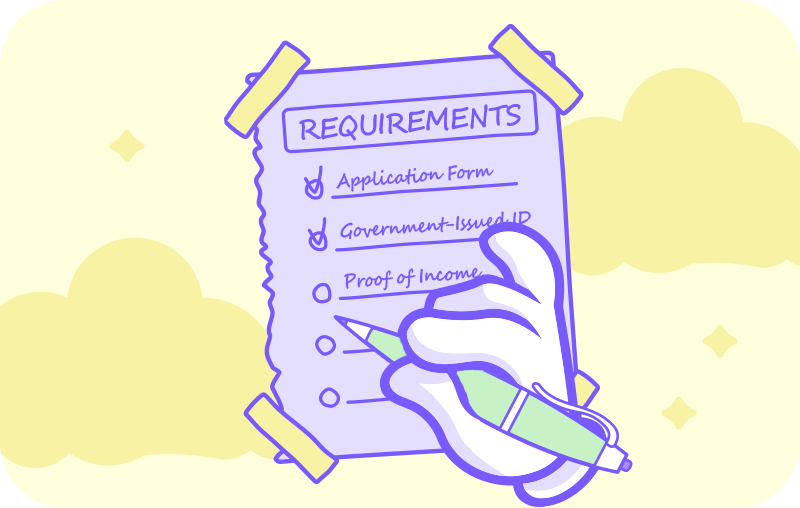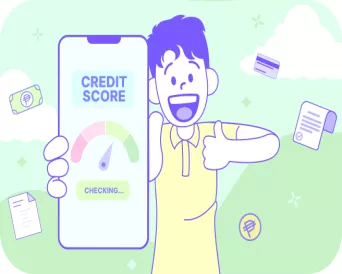There's no doubt that the idea of getting a personal loan is exciting. After all, who wouldn't want to get a truckload of cash within a short amount of time?
When done right, a loan can be the key to various wants and needs such as fulfilling your goals, growing needs, or home renovation projects. This is especially true in the Philippines, where - let's face it - money can be hard to come by.
But before you can get your hands on that sweet, sweet bread, you have to prepare your personal loan requirements.
Personal loan requirements may seem tedious and a waste of time and that’s totally understandable. With the list of documents you have to prepare and the factors you have to worry about, it all feels like homework.
What you’ll quickly learn, though, is that it’ll all be worth it. Before you rage quit and decide to not take that personal loan anymore, take the time to read this handy lil’ blog!
Why Do I Need to Get Qualified for a Loan?
Before we jump into the meat of the discussion, let’s answer one question you probably have: why do I need to get qualified for a loan, anyway? Why can’t I just go to a bank and borrow the cash I need?
Imagine if someone asked to borrow PHP 50,000 from you. This person is only an acquaintance at best. You know how old they are and that they’re employed, so you at least have some vague assurance that they’ll be able to pay you back.
Even then, could you confidently say that you feel safe lending that PHP 50,000? We’re willing to bet PHP 50,000 – maybe even more - that your answer is no.
Just like you, reluctant lender, banks want 100% assurance that you can pay back the money you want to borrow. Plus, it’s important to note that PHP 50,000 is a common minimum loan amount.
Some loans allow you to borrow anywhere between PHP 250,000 to PHP 5,000,000. For loan amounts like that, you’re going to need even more assurance. That’s why you need to get qualified for a loan first.
Now that you understand the necessity of loan requirements and qualifications, let’s dive into the 4 common factors that lenders look into when you apply for a personal loan.
4 Common Factors in Getting Qualified for a Loan

Lenders watch out for different factors to determine whether you’re qualified for a loan or not. These factors also depend on what type of loan you’re getting, whether it be secured or unsecured loans.
It’s better to be safe than sorry, so read up on these common factors below.
Your Collateral
Collateral refers to valuable assets pledged to a lender as security for a loan. This can include property such as homes or vehicles, as well as cash, investments, or real estate.
If you’re unable to repay the loan, the lender may seize the collateral to recoup the remaining balance. This is for secured loans only, though, so if you’re getting an unsecured loan, this isn’t something you have to worry about!
Your Income
Lenders set income requirements to make extra sure you can repay the loan. The minimum income requirement is different for every lender, and some may not even disclose it.
As proof of income, you can submit documents such as your BIR Form 2316, your latest payslip, or a Certificate of Employment.
Your Debt-to-Income (DTI) Ratio
This next factor is the percentage of your gross monthly income that you use to pay your debts. A loan is essentially a debt, so lenders tend to use this to determine whether you can be a good borrower or not.
The sweet spot for this is around 36% to 50%. For better chances of being qualified, you should aim to go lower than that range.
Your Credit Score
We saved one of the biggest factors for last! In a nutshell, your credit score is your overall rating as a borrower. It’s based on the amount of your outstanding debt(s), how good your payment score is, and your credit score history’s length.
Some loans require a credit score of 600, while others – like our Quick Loan – don’t require a credit score at all. Even if you don’t plan on taking out a loan any time soon, it’s important that you check your credit score
The Role of a Co-signer
Sometimes, despite your best efforts, your credit score or income might not meet the stringent requirements of lenders. This is where a co-signer comes into the picture, offering a beam of hope. A co-signer is someone who agrees to back your loan application along with you, promising to take on the responsibility of the loan if you're unable to make the repayments.
Having a co-signer can significantly boost your loan application, especially if they have a strong credit history and stable income. It's like having a financial buddy who stands with you, telling the lender, "I've got their back." This can be a game-changer for those who might otherwise struggle to secure a loan on their own terms.
However, it’s crucial to approach this option with care. Ensure your co-signer fully understands the responsibilities and potential risks involved. After all, their credit score is on the line too. It's not just about getting the loan – it's about maintaining relationships and financial health for both parties involved.
Considering Pre-Approved Loans
Understanding pre-approved loans can be a game-changer in your loan application process. Pre-approved loans are initial loan offers given by lenders to individuals who meet certain eligibility criteria, based on their financial history and creditworthiness. These offers often come with predetermined borrowing limits and terms. Opting for a pre-approved loan can simplify and expedite your loan application, luv, as the lender has already assessed your financial background. But make sure to closely review these offers to make sure you’re actually getting a good deal.
Personal Loan Requirements You Should Prepare Before Applying

Just like the factors that can affect your qualification for a loan, the documents you need vary from lender to lender. But there are a few similarities you should be prepared with, such as:
- A signed and filled out application form
- A government issued ID with photo and signature
- For employed borrowers: Income documents like Certificate of Employment, latest ITR, and latest payslip
- For self-employed borrowers: Business/mayor's permit, latest bank statement, at least 3 trade references (1 supplier and 1 customer), DTI certificate or SEC registration, and Audited Financial Statement (at least 1 year)
Apply for Fast and Easy Online Loans at Tonik Digital Bank
Just because you're qualified and you already have all the personal requirements, it doesn't mean you should take one out right away. You have to assess if you're ready first. A good way to find out is to ask yourself questions like "How much can I afford to borrow?" or "How will I be able to repay it?"
If you have concrete answers to all the important questions, congratulations: you’re ready to take out a personal loan!
While it’s best to shop around first, you should seriously consider applying for ours. Not only do we ask for minimal requirements, but you can apply for them super quickly through our app.
Don’t believe us? See for yourself when you download the Tonik App today!







